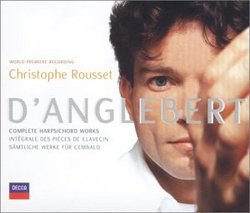A truly breathtaking clavecin performance
M. Wright | Waterloo, ON, Canada | 02/07/2005
(5 out of 5 stars)
"D'Anglebert inherited the crown of the French clavecin from Chambonnieres and Louis Couperin. His compositions remain some of the most powerful expressions of the French baroque clavecin style at the height of Lully's musical dictatorship of France. The noble, dignified and subtle style of this music was anticipated in the 1687 book of pieces de clavecin by E.C. Jacquet de la Guerre, but D'Anglebert takes everything to an entirely new level. The forms are lengthened, and elements of classicism begin to appear in the formal structures of the pieces. No wonder he occupied the most important keyboard position in the court of Louis XIV!
What can I say? This is my favourite recording of Baroque French harpsichord music, hands down. D'Anglebert has always had a special place in my heart, and Rousset doesn't let my expectations down. The Colmar Ruckers coupled with the period tuning gives an interesting timbral and psychological effect to the music. My favourite track by far is D'Anglebert's stunning transcription of the passecaille from Lully's Armide (executed masterfully by Rousset). A must-have for 17th century clavecin afficionados."
D'Anglebert/Ruckers/Rousset = beautiful music
Joel R. van Lennep | nr. Boston, Mass. | 09/10/2009
(5 out of 5 stars)
"This is a two-CD box of music played on a 1624 Ruckers harpsichord rebuilt in Paris in the late 17th century. The instrument, formerly the property of the of the Marquis de Sade family, now resides in the Musee d'Unterlinden in Colmar, in which the recording was made. The sound of the instrument is simply wonderful.
Wonderful also is the music. D'Anglebert was "Ordinaire de la musique de la chambre du roi[Louis XIV]". In 1689, he published an collection of four suites - each of many movements, in G, D, g and d. The music is of extraordinary richness and variety; e.g., profound unmeasured preludes, sarabandes, a passacaille, a tombeau, etc.; graceful, danceable allemandes, courantes, gigues, minuets; and many arrangements of dance movements and charming airs from operas by Lully, which, without significant intrusion, he adapts to the distinct idiom of the clavecin.
The plenitude, variety, and ubiquity of the ornaments is astonishing - there are vitually no measures lacking at least one; most have many. The artist, Christophe Rousset, has mastered the craft of spinning off these with a fluent lightness perferctly suited to the music. The rustling flow of sound sings and fairly sparkles with them.
The instrument, tuned very accurately in meantone temperament, has a perfect balance of clarity, resonance, warmth and sustain, with a beautiful, late-autumn-afternoon "golden" quality, which I find completely seductive - fully evocative of "L'Age d'Or"
Rousset's playing is flawless and generally appropriate - except, to my taste, for one thing. There is at certain times a sense of alacrity, glibness, even occasionally superficiality, born, perhaps in part, of his amazing technical achievements. (Perhaps, also, he may have felt the pressure of fitting almost 160 minutes of music onto just two CDs, a feat he just barely accomplishes!)
This is music of nobility, tender sentiment, elegance and variety of means, all of it permeated by that slight, soft nostalgia which is all its own.
The recording is currently out of print. Consider looking for it on the internet; if you love this music, I think you will find it to have been well worth the effort and expense.
Joel van Lennep, 9/10/'09
"
So very beautiful
Joel R. Van Lennep | Rindge, New Hampshire, USA | 12/18/2007
(5 out of 5 stars)
"I found that "notre clavecinist canadien", M. Wright, stated very well what I also feel. This is music of the highest order, noble in tone, deeply feeling but restrained, beautiful in both harmony and melody. The instrument's warmth and exceptional richness of timbre never detracts from its essential clarity of speech. Mr. Rousset's command of the instrument, the idiom, the complex repertory of ornamentation, and not least the gallant spirit of the music itself is commendable.
My only reservations are with his tendency occasionally to rush dotted notes, and, in a few instances, to toss off certain of the lighter pieces a bit too hastily. But let this be "praising with faint damning"!
Anyone who loves late 17th century French music should purchase this gem!
J. v.Lennep, "luthier americain""


 Track Listings (32) - Disc #1
Track Listings (32) - Disc #1